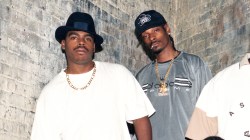Kendrick Lamar‘s To Pimp a Butterfly has become the highest-rated album of all time on one of the internet’s most popular fan review websites.
The Compton rapper’s third studio album surpassed Radiohead’s OK Computer on Thursday (January 31) to become No. 1 on the list of top albums of all time on Rate Your Music.
The website, which allows users to rate and review music, pointed out on Twitter that “this is the first time in nearly a decade that Rate Your Music has had a new #1 album.”
To Pimp a Butterfly has an average score of 4.34 out of 5 based on 58,322 ratings and 491 reviews, with OK Computer now trailing close behind with a 4.26 rating.
Elsewhere on the list, albums from Pink Floyd, King Crimson, MF DOOM and Madlib, My Bloody Valentine and The Beatles rank in the top 10, while K. Dot’s good kid, m.A.A.d city sits at No. 11.
Rate Your Music isn’t the only website where Kendrick Lamar’s catalog is highly rated. To Pimp a Butterfly is the fifth highest-rated album of all time on Metacritic with a score of 96 out of 100, while DAMN. holds the No. 8 spot with a 95 rating.
Released in March 2015, To Pimp a Butterfly debuted at No. 1 on the Billboard 200 after selling 324,000 copies in its first week. The album boasted appearances from Snoop Dogg, Rapsody, George Clinton, Bilal, Thundercat, Ronald Isley, James Fauntleroy and Anna Wise, and included singles such as “Alright” and “King Kunta.”
Speaking to the Grammys in 2015, Kendrick Lamar revealed a trip to South Africa served as one of the biggest inspirations for the jazz and funk-infused project.
“I felt like I belonged in Africa,” he said. “I saw all the things that I wasn’t taught. Probably one of the hardest things to do is put [together] a concept on how beautiful a place can be, and tell a person this while they’re still in the ghettos of Compton. I wanted to put that experience in the music.
“There’s a separation between the light and the dark skin because it’s just in our nature to do so, but we’re all Black. This concept came from South Africa and I saw all these different colors speaking a beautiful language. I wanted to do a record like this on my debut album but I wasn’t confident enough.”
He added: “The title grasped the entire concept of the record. [I wanted to] break down the idea of being pimped in the industry, in the community and out of all the knowledge that you thought you had known, then discovering new life and wanting to share it.”
To Pimp a Butterfly helped Kendrick Lamar earn 11 nominations at the 2016 Grammy Awards, where he won Best Rap Album along with Best Rap Song (“Alright”), Best Rap Performance (“Alright”) and Best Rap/Sung Performance (“These Walls”).
![Method Man Admits He Didn't Like Drake's "Wu-Tang Forever": "I [Wasn't] Getting On That"](https://hiphopdx.com/wp-content/uploads/2025/12/method-man-drake-wu-tang-forever-remix.jpg?w=250)









Classic album! 5 Star-G
Lmao. I wouldn’t even consider TPAB to be a top 10 in hiphop albums.
Wow
Why, is that surprising? Hell, even Masta Aces “Disposable Arts” DESTROYS TPAB, and thay album never gets mentioned as a top 20. Section 80 is even better than TPAB.
It was a good album, great message and the cover makes for great wall art but as far as hip hop albums go ill take “DAMN” or Gkmc anyday over TPAB or the hotsteppers album.
Ok so 50+ thousand people, probably majority born after 1990, rated this to be #1. No need for alarms people…..anyone who knows their hip hop, I mean really knows, wont be bothered by this.
Another example of how far the quality of hip-hop has fallen.
Shit is overrated american trash…
Definitely his second worst album.
What to write about an album that will still hold material for books even decades from now, because it has to be read like one itself? About an album that brings together funk monsters of the seventies with space jazz nerds of today, and in every corner of its deep black DNA holds allusions and answers to the music that made such things possible in the first place.
Hip hop can be so many things and is often so few. In Kendrick Lamar, we have a rapper whose vision of hip-hop is not only above-average in all respects, but in its implementation breaks boundaries that the competition has not even encountered yet. Boundaries between 70s funk, bagpipe jazz, gangsta rap and spoken word, but also boundaries between generations and the battles they fought. Between the slave Kunta Kinte, who lived in Virginia in the 18th century, had his foot chopped off after trying to escape and is now crowned king by Lamar, and his descendants, who face new old problems in a post-Ferguson America, but also a strengthened black self-confidence and understanding. Between the dreams, desires and prophecies of a Tupac Shakur anno ’94 and the philosophy of life of his legitimate successor two decades later.
What to write about an album that will still hold material for books even decades from now, because it has to be read like one itself?
Hip hop can be so many things and is often so few. In Kendrick Lamar, we have a rapper whose vision of hip-hop is not only above-average in all respects, but in its implementation breaks boundaries that the competition has not even encountered yet. Boundaries between 70s funk, bagpipe jazz, gangsta rap and spoken word, but also boundaries between generations and the battles they fought. Between the slave Kunta Kinte, who lived in Virginia in the 18th century, had his foot chopped off after trying to escape and is now crowned king by Lamar, and his descendants, who face new old problems in a post-Ferguson America, but also a strengthened black self-confidence and understanding. Between the dreams, desires and prophecies of a Tupac Shakur anno ’94 and the philosophy of life of his legitimate successor two decades later.
What to write about an album that will still hold material for books even decades from now, because it has to be read like one itself?
Hip hop can be so many things and is often so few. In Kendrick Lamar, we have a rapper whose vision of hip-hop is not only above-average in all respects, but in its implementation breaks boundaries that the competition has not even encountered yet. Boundaries between 70s funk, bagpipe jazz, gangsta rap and spoken word, but also boundaries between generations and the battles they fought. Between the slave Kunta Kinte, who lived in Virginia in the 18th century, had his foot chopped off after trying to escape and is now crowned king by Lamar, and his descendants, who face new old problems in a post-Ferguson America, but also a strengthened black self-confidence and understanding. Between the dreams, desires and prophecies of a Tupac Shakur anno ’94 and the philosophy of life of his legitimate successor two decades later.